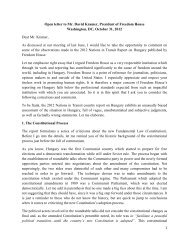The Fate of Western Hungary 1918-1921 - Corvinus Library ...
The Fate of Western Hungary 1918-1921 - Corvinus Library ...
The Fate of Western Hungary 1918-1921 - Corvinus Library ...
Create successful ePaper yourself
Turn your PDF publications into a flip-book with our unique Google optimized e-Paper software.
every attempt aimed at forcibly splitting them from <strong>Hungary</strong>.” 201<br />
Meanwhile, the Austrian military preparations for the occupation <strong>of</strong> the<br />
Borderland continued. Also on February 17, the Hungarian National Army’s<br />
High Command notified the Prime minister and other affected ministries in a<br />
report (11 593 / I. a.) that, according to information received from the Chief<br />
District Magistrate <strong>of</strong> the Németújvár district, 2,000 well-armed soldiers were<br />
transported by rail from the Styrian town <strong>of</strong> Feldbach, close to the Austrian-<br />
Hungarian border. 202<br />
<strong>The</strong> Soproni Hírlap (Sopron Gazette) published a special edition at the end<br />
<strong>of</strong> March in which it addressed – in French, German and Hungarian – a<br />
Proclamation to the members <strong>of</strong> the Entente Military Mission in Sopron. <strong>The</strong><br />
proclamation drew the Mission’s attention to the fact that, during the time <strong>of</strong><br />
the Hungarian Red Terror, “the Austrian socialist government (…) showed<br />
scant regard for the troubles <strong>of</strong> their ‘German brothers’ [<strong>of</strong> <strong>Western</strong> <strong>Hungary</strong>]<br />
but rather showed at every turn their sympathy towards the Bolsheviks. (…)<br />
With the end <strong>of</strong> Bolshevism, Austria suddenly changed into the guardian angel<br />
<strong>of</strong> <strong>Western</strong> <strong>Hungary</strong>, to free our people from Christian terror and persecution <strong>of</strong><br />
Germans, which do not exist. Nobody here knows anything about German<br />
persecution. <strong>The</strong> punishment <strong>of</strong> Bolshevik misdeeds can only be interpreted as<br />
persecution <strong>of</strong> Germans through malicious slander. <strong>The</strong> cultural and political<br />
rights <strong>of</strong> Germans are guaranteed by Hungarian minority laws, which have been<br />
broadened recently in the most liberal spirit.” <strong>The</strong> Proclamation then points out<br />
that, through almost four centuries, Austria “has done everything to destroy<br />
<strong>Hungary</strong>’s ancient constitution and force German language and German law on<br />
the Hungarians. Vienna was not particular in its methods when it came to<br />
crushing national resistance.” 203<br />
<strong>The</strong> leaders <strong>of</strong> the Hungarian freedom fights died in exile (Ferenc Rákóczi<br />
II, prince <strong>of</strong> <strong>Hungary</strong> and Transylvania, Governor and President Lajos<br />
Kossuth), 13 Hungarian generals were executed on October 6, 1849 in Arad,<br />
and hundreds more executed. “Our lands make a perfect historical, cultural and<br />
economic unit with the mother country, the breaking <strong>of</strong> which is pointless for<br />
Austria, ignominious for <strong>Hungary</strong>, and would be ominous for our little rural<br />
area. (…) No, gentlemen, the people <strong>of</strong> <strong>Western</strong> <strong>Hungary</strong> are not willing to<br />
sacrifice themselves for a sick neighbor. (…) You will not shove us around on a<br />
map like chess pieces, hither and yon, we demand our right to self<br />
determination, a plebiscite. (…) Your mission, gentlemen, is to enlighten the<br />
powerful <strong>of</strong> the world and draw the attention <strong>of</strong> the peace conference to a small<br />
but determined people who demand that their voice be heard before decisions<br />
are made <strong>of</strong> their fate. Do this, gentlemen, without prejudgment and the thanks<br />
<strong>of</strong> three hundred thousand people will follow you back to your country.”<br />
<strong>The</strong> editors added the following comment, in bold typeface, to the<br />
201 MOL. K 26. 1920. csomó. 1920 – XLII–2035. szám, 33. old.<br />
202 Ibid, 1920 – XXII–1511. szám, 1. old.<br />
203 Soproni Hírlap, (year VII, issue 73) March 30, 1920, p. 3.<br />
86
















